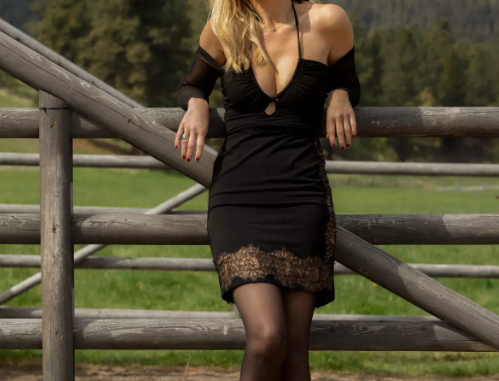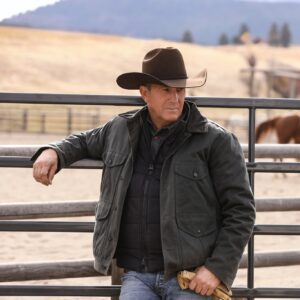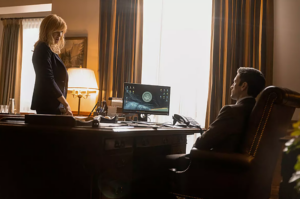
When did you realize Beth had become such a breakout character?
Halfway into the second season, I started to feel there was more conversation about her. People dressed up as her on Halloween. That’s when I started to realize that she had entered the zeitgeist. It’s been fascinating to watch and — I’ll be honest, as an actor — slightly intimidating and a little bit scary. I do try to keep it at arm’s length, what people have to say about her. To some women, she’s a hero. Others find her despicable. Neither side is right or wrong, and that’s the sort of the joy of her.
I heard that when people recognize you, they want to high-five you or fight you.
They’re more disappointed when they meet me. They expect me to have Taylor Sheridan verbiage and Beth’s attitude. As soon as I stop playing her, I drop that attitude quite quick. Also, I’m British, so that’s always a revelation to people. I actually think it’s better if they don’t know anything about me so I can fully inhabit and disappear and people can think she’s real. In a weird way, I like that.
She is certainly a life force. Is it more challenging to play the raw Beth or the more vulnerable Beth?
They’re the same character. But in different circumstances, who does she reveal? People talk about the angry woman, the sensitive woman, the emotional woman. I have all of those women in me. Beth is a force of nature, so with that comes an incredible amount of adrenaline. An energy rushes through my body and mind. It’s like getting into a sports car or riding a thoroughbred. There is something more powerful than you, and you better hold on. I don’t always agree with her. Some of the time, I do. Sometimes I wish I could have more of what she has.
The chemistry of this cast is so front and center. Kevin really seems like your father, and Beth adores him so much.
When I first read the script, the strongest thing that stood out was her devotion to her father. She’s a warrior for him, and there’s a righteousness to that. I find that really beautiful and tragic. It’s not difficult with Kevin — he really is that patriarchal all-American. He is iconic in playing that figure. I adore my scenes with him.
We really have to talk about the toxic relationship between Beth and her brother Jamie. She has so much hostility toward him, but I wonder if that isn’t mixed with love. Both of them were young when that pivotal breakdown in their relationship took place, and people make mistakes.
[Laughs] I wish you and I could sit down with Beth and tell her that. But she’s not interested. It’s such a deeply embedded wound. “Yellowstone” is this all-American TV show, but there are tragic Greek elements in it. She is blinded by her rage and her feeling that her brother betrayed her. He agreed to have something done to her that would affect the rest of her life, and she can’t make peace with it. I’m longing for her to find forgiveness for herself and Jamie. But that is one relationship where there is deep hurt, and it does come out of love. If they didn’t love each other, why would it matter so much? She would just brush him off like another dude at the bar. But it does matter. She does love him. She also hates him.
At the other end of the spectrum is this glowing romance between Beth and Rip. Again, there is such electricity between you and Cole Hauser, who plays him.

I had just turned 40 when I got the role of Beth. I think Cole is three or four years older than me. We have both been working for many, many years, and we were both aware of how fortunate we were and how rich the material was. Neither of us phone it in. We work really hard, and we both have a lot of fondness for each other as people. We’re both happily married people and we’re in a playing field of complete safety and respect. The writing of these two characters together is beautiful, and we’re not going to mess that up.
You grew up in another country. How familiar were you with the genre of the western before you joined “Yellowstone”?
It’s certainly not in my DNA. I didn’t think of it as entering into a genre. I just thought of it as entering into another character. Beth became my dominant responsibility and obsession. Now I live in Montana five months of the year. We film on an actual ranch. I ride horses every day. I’m friends with cowboys and cowgirls and ranchers. I have gone on a journey of understanding a culture and a way of life that I didn’t before. That’s been a real gift to me. It’s really humbling and complex.
So without spoiling what’s going to happen, what can you say about the theme of the show this season and Beth’s story?
Beth inhabits a depth of furiousness this season. We’ve seen that in her before, but she’s going even further. There’s a hint of fear in it — will she be able to save the ranch or is it a foregone conclusion that that will slip through our hands?
Also, Taylor has given Beth — I don’t want to spoil it, but Beth gets on a horse this year and goes on a cattle ride with her father and brother and 50 or 60 cowboys. It’s like this yearly pilgrimage to bring the cows home. Beth has never done it, but now she wants to go. Rip thinks she’s crazy. There’s something about seeing Beth, who is the daughter of a rancher and the wife of a cowboy, embrace a part of her soul that she’s never had much time for.

Early on, someone pointed out a horse to her and she said, “I don’t go near those f— things.”
Exactly. She’s terrified of horses. A riding accident caused her mother’s death. I just wanted Beth to go deeper in her own soul, and you see a little glimmer of that. There’s also a tremendous amount of moments this season where she is a furious woman. That’s probably the most challenging aspect of her — her violence. Taylor does not shy away from it. And neither do I.